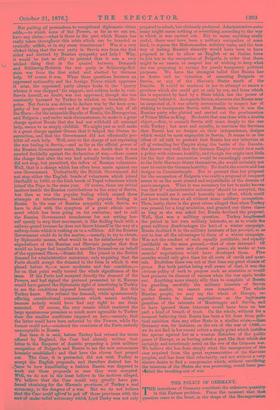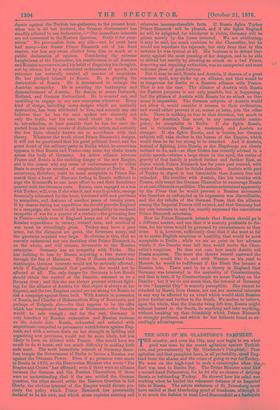.111/4 POLICY OF GERMANY.
THE intentions of Germany constitute the unknown quantity in this Eastern problem. From the moment that that question came to the front, in the shape of the Herzegovithan ermeute against the Turkish tax-gatherers, to the present hour, when war is all but declared, the German Government has steadily adhered to one declaration,—" Our immediate interests are not concerned in the Eastern Question. Settle it for your- selves." No provocation from any side—and he must have had many—has drawn Prince Bismarck out of his fixed reserve, nor has any event elicited from him so much as a public declaration of opinion. Considering the extreme haughtiness of the Chancellor, his sensitiveness to all Austrian and Russian movements, and his habit of disguising his thoughts, not by silence, but by a calculated recklessness of speech, this reticence has naturally created all manner of suspicions. He has pledged himself to Russia. He is plotting the destruction of Russia. He is determined to enlarge the Austrian monarchy. He is awaiting the bankruptcy and dismemberment of Austria. He desires to annex Denmark, Holland, and German Switzerland. He is wearied out, and unwilling to engage in any new enterprise whatever. Every kind of design, including many designs which are mutually destructive, has been attributed to him, and scarcely any one believes that he has for once spoken out sincerely not only the truth, but his own mind about the truth. It is, nevertheless, at least possible that he has for once de- parted from his usual course of diplomatic action, and certainly the few facts already known are in accordance with that theory. Whatever the truth about Prince Bismarck's designs, it will not be questioned that his great political dread, and the great dread of the military party in Berlin which he sometimes opposes, is that Russia and France may some day shake hands across the body of Germany. An active alliance between France and Russia is the standing danger of the new Empire, and is the reason why any cause of embarrassment to either State is secretly an occasion of congratulation at Berlin. No occurrence, therefore, could be more acceptable to Prince Bis- marck than a burst of Slavonic feeling in Russia sufficient to urge the Romanoffs to one more effort to end their hereditary quarrel with the Ottoman caste. Russia, once engaged in a war with Turkey, will, even if she wins it, and wins it quickly, emerge financially exhausted for the hour, burdened with new provinces to assimilate, and desirous of another peace of twenty years. If by chance during her expedition she should provoke England to a campaign, she would in all human probability be rendered incapable of war for a quarter of a century—the governing fear in France—while even if England keeps out of the struggle, Russian expenditure in money, trained men, and materiel of war must be exceedingly great. Turkey may have a poor army, but the distances are great, the fortresses many, and the garrisons required very large. So obvious is this, that we scarcely understand any one doubting that Prince Bismarck is, on the whole, and will remain, favourable to the Russian enterprise. Germany has no sympathy with Turks. She has nothing to lose by Russia acquiring a free water-way through the Sea of Marmora. Even if Russia obtained Con- stantinople, German interests would not be seriously affected ; while if England obtained that position, she would not be affected at all. The only danger for Germany is lest Russia should obtain the control of the Danube, assumed to be a German river ; and this she can always prevent without fight- ing, for the alliance of Austria for that object is always at her disposal, and the two Empires united are too strong for Russia to risk a campaign against them both. With Austria in possession of Bosnia, and Charles of Hohenzollern King of Roumania, and perhaps of Bulgaria also—for that appears to be the offer which has terminated hesitation at Bucharest,—the Danube would be safe enough ; and for the rest, Germany is only benefited by Russian exhaustion and Russian increase on the Asiatic side. Russia, exhausted and satiated with acquisitions, compelled to permanent watchfulness against Eng- land, and with a serious drain on her strength in holding and organising new provinces, would not be more likely, but less likely to form an alliance with France. She would have too much to do at home, and too much difficulty in making both ends meet. The most immediate interest of Germany there- fore tempts the Government of Berlin to favour a Russian war .against the Ottoman Power. Even if no promises were made to Russia in 1870, as the Hanoverian Minister who wrote "For Sceptre and Crown" has affirmed; even if there were no alliance between the German and the Russian Chancellors, if there were no understanding that if the one settled the German question, the other should settle the Eastern Question in full liberty, the obvious interest of the Empire would dictate pre- cisely the policy which Prince Bismarck has persistently declared to be his own, and which alone explains existing and
otherwise incomprehensible facts. If Russia fights Turkey Prince Bismarck will be pleased, and if she fights England he will be delighted, for whichever is victor, Germany will be gainer merely by the losses incurred. We are attributing, it may be said, too much cynicism to the Chancellor, but he would not repudiate the reproach, but only deny that in this instance he was cynical at all. His business is to defend Ger- many against the most pressing of her dangers, and to be able to defend her merely by allowing an attack on a bad Power, deserving and requiring extinction, was an unexpected and most welcome piece of good-fortune.
But it may be said, Russia and Austria, if sharers of a great common spoil, may strike up an alliance, and that would be as dangerous for Berlin as a Russian alliance with France. That is not the case. The alliance of Austria with Russia for Eastern purposes is not only possible, but is happening ; but the affiance of Austria with Russia for an attack on Ger- many is impossible. The German subjects of Austria would not allow it, would consider it treason to their civilisation, and would either prevent it or, sooner or later, join the other side. There is nothing to fear in that direction, but much to hope, for Austria's line must, in any conceivable contin- gency, be acceptable to Berlin. If she fights Russia, and is victorious, Russia is weakened, and Austria no stronger. If she fights Russia, and is beaten, her German subjects will take shelter in the bosom of the Empire, which would then be far too strong to be attacked. And if Austria, instead of fighting, joins Russia, as the Hapsburgs are clearly inclined to do, and—as Herr Giskra has recently advised in a public speech—claims a large share in the spoil, the centre of gravity of that family is pushed farther and farther East, an object which Prince Bismarck has for years past avowed, with cynical frankness, that he thinks desirable. Austria with part of Turkey to digest is less formidable than Austria free and unloaded. His troubles with Austria, like his troubles with France, only tempt the German Chancellor to encourage Russia in an anti-Ottoman expedition. The notion entertained apparently by the Times that he would prevent a Russian movement was therefore as unfounded as its expression was discreditable, and the dry rebuke of the German Press, that the alliance among the Imperial Powers still existed, and that Germany had her own interests to care for, exactly expressed the convictions Prince Bismarck entertains.
How far Prince Bismarck intends that Russia should go is a different matter, and one that it is scarcely profitable to dis- cuss, for his views would be governed by circumstances as they arose. It is, however, sufficiently clear that if she went so far as to excite English suspicion or hostility, that would be most acceptable to Berlin ; while we see no point in her advance which, if the Danube were left free, would excite the Chan- cellor's suspicion. He does not care how much Asiatic soil Russia acquires. The more she throws herself eastward the
better he would like it, and with Warsaw as his road to Moscow, he would be indifferent if the Black Sea became a
Russian lake. There used to be a theory in England that Germany was interested in the neutrality of Constantinople, and that is true, if by Constantinople we mean Turkey on the Danube ; but if we do not mean that, the interest of Germany in the "Imperial City" is scarcely perceptible. She cannot be attacked by Russia from thence, nor can her material interests in any way be affected by an event which would shift Russian power further and further to the South. We incline to believe, upon the whole, that the Danube being left free, Russia might exhaust herself in the South, do anything and take anything, without breaking up that friendship which Prince Bismarck so strongly professes, and which he has hitherto found so ex- ceedingly advantageous.



































 Previous page
Previous page